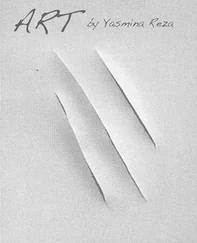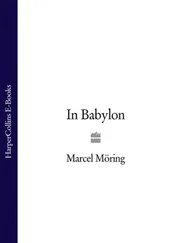* * *
Those clusters come together, come apart. You could describe men’s life like that. We too set out in the Police Emergency car. In the shopwindows I saw us passing with the flashing light and the siren howling. There’s a certain unreality to seeing yourself being transported at top speed, like seeing your own speeding train reflected in another one. At the station house, I was taken downstairs to a mezzanine. I was set on an iron bench that had handcuffs welded to it. Now I had only a single hand attached. I waited awhile there and then they took me into an office, they told me I had the right to remain silent, to see a doctor, a lawyer, to alert my family. I asked them to call Pierre. I said I had no lawyer and that they could call whoever they wanted. A woman searched me again and took a scraping from the inside of my mouth. In the corridor she asked if I wanted to go to the toilet before I was put into jail (jail!!). The primitive stand-up Turkish latrines. I said to myself, A few hours ago you were slicing an orange cake in your flowing party dress. I went into the dilapidated cell with a bench at the rear. There was a mattress on a linoleum floor with an orange wool blanket folded on it. The woman told me I could rest a little while I waited for the lawyer, who’d be coming at around seven o’clock. She closed the door with an extravagant racket of locks and latches. The wall that gave onto the corridor, including the door, was entirely glass with bars. I sat down on the bench. Was Jean-Lino somewhere in the place? And poor Lydie in her suitcase . . . with her scarf on crooked and the crazy hair, the rumpled skirt . . . All those ornaments turned useless from one minute to the next. The red Gigi Dool pumps tossed into the grave. A colleague of Pierre’s died a month ago. Etienne had phoned to tell Pierre but he got me instead. He asks, “You know who Max Botezarlu is?” “By name.” “He just died, instantly, a stroke in the Metro.” “A good death,” I said. “Oh really—you’d like that kind of death for yourself, would you?” “Yes.” “You wouldn’t want to see it coming, prepare yourself, like in La Fontaine, Feeling death was coming he brought together all his dear ones ?” “No. I’m afraid of the deterioration.” There was a silence at the other end of the line and then he said, “Still, it’s better to die with people around you. Or actually maybe not.” I put the orange blanket over my knees. It scratched. I pulled together the edges of Lydie’s coat as a liner.
* * *
“ Well then . . .” In the storage room where I meet with the lawyer everything is gray. The floor tiles, the walls, the table, the chairs. Everything. The two chairs are bolted to the floor and so is the table. No openings. Hideous lighting. Earlier I’d had a small carton of orange juice and a dry cracker. Gilles Terneu, lawyer. He had long pepper-and-salt hair brushed back, and a neatly barbered mustache-beard arrangement. A well-groomed man, my mother would have said, who banked on his coiffure from the moment he woke up. I was slightly embarrassed by my Kitty pants and fur slippers, but mostly by the coat that only reached to my forearms. He opened his briefcase, pulled out a notepad and a pen. He said, “Well then . . . Madam, do you know why you’re here?” I might be exhausted, but still I knew why I was here. I recounted the events. Well, I mean, the minimal official version.
“What exactly are your ties to this man, madam?”
“He’s a friend.”
“Madam, you do know that we have a criminal matter here. The investigations to be carried out will be very thorough. Into your life as well. Do not think that at this stage you can conceal things. They’ll come out sooner or later.”
“He’s a friend.”
“A friend.”
“He’s a neighbor who’s become a friend.”
“Did you suspect anything?”
“What do you mean?”
“When you were watching through the peephole.”
“When my husband suggested he should call the police, I’d felt he was hesitant . . .”
“You weren’t sure he’d call the police . . .”
“No, I wasn’t completely sure he would call the police . . . And when I saw the elevator going down . . . and since I hadn’t seen anything or heard anything outdoors, when I was also looking out the window . . .”
“You were in your nightclothes?”
“Yes.”
“And your husband? He didn’t hear you go down?”
“My husband was sleeping.”
“Is he still sleeping?”
“I don’t know. I asked them to let him know.”
“Does your husband have his doubts about your relationship with this man?”
“No. No, no.”
“We don’t have much time, ma’am. We have a half hour and you’re going to be—when you leave this interview—you’ll be questioned by the police, probably even confronted with your neighbor, Monsieur . . .”
“Manoscrivi.”
“Manoscrivi. Obviously, one hopes that the two versions do not contradict . . . Do you think he might say something different?”
“No . . . There’s no reason to.”
“Good. The advice a lawyer gives, as a general rule, is to say as little as possible to the police so as not to be caught up later in one’s own statements. Still, your version seems plausible, it’s possible that you will have some interest in speaking. That is, in going into some detail. But, madam, I call your attention to the fact that what you say here will later be used as an initial statement of truth to contest what you say later.”
“It is the truth . . . There is one thing I haven’t mentioned . . . which changes nothing but I want to tell everything . . . Actually there are two things . . . Downstairs, when I was downstairs in the lobby trying to persuade him to call the police, we ran into a neighbor . . .”
“Someone you know?”
“Yes, a girl I say hello and goodbye to—she’s the daughter of—”
“Wasn’t she surprised to see you at three in the morning?”
“She said hello, she looked as if she was coming in from a party . . .”
“The tenants in the building know you and he are friends?”
“I couldn’t say. Yes probably.”
“Did she look surprised?”
“No, no, not at all.”
“The situation was fairly ordinary . . .”
“Ordinary. She seemed eager to get out of the rain, she went right into the elevator, the whole thing took two seconds. We just crossed paths . . . And the other thing is, after calling the police, Jean-Lino Manoscrivi wanted to put his cat someplace safe. So we went back to his apartment, picked up his cat, and put it in our apartment. His cat is in our place now.”
“You seem to be awfully concerned with this man’s life . . .”
“Yes . . .”
“And you say that the relationship is only one of friendship.”
“Yes.”
“You don’t think you might have left some trace of a relationship that could seem different in nature from what you describe?”
“No.”
“You never exchanged emails, for instance? Your sites will be checked.”
“Never any emails.”
“And he . . . you don’t think he might harbor some feelings . . . you believe you’re on the same wavelength?”
“That I can’t say, but he’s never shown anything . . .”
“There’s no material evidence that could imply that this is a romantic relationship even though you declare it a—”
“None.”
“For instance, your husband has never been jealous of the relationship?”
“Never.”
“You have no reason to help this man in an act that could be a criminal act?”
“None at all.”
“You’ll be asked the question: You learn your friend has killed his wife . . . How far would you go if he asked you to help him?”
Читать дальше

![Ясмина Сапфир - Охотница и чудовище [СИ]](/books/35157/yasmina-sapfir-ohotnica-i-chudoviche-si-thumb.webp)
![Ясмина Реза - Бог резни [=Бог войны]](/books/63616/yasmina-reza-bog-rezni-bog-vojny-thumb.webp)
![Ясмина Реза - Бог войны [=Бог резни]](/books/63617/yasmina-reza-bog-vojny-bog-rezni-thumb.webp)








